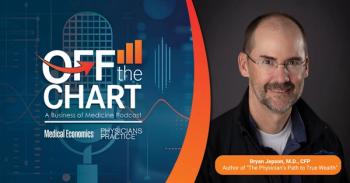
Physician Ranked Among Top ‘Overrated’ Jobs
Is the sense of fulfillment in practicing medicine outweighed by the challenges and stress involved?
Growing up the daughter of a family physician, my father constantly reminded me of the merits of medicine. He never pressured me to become a doctor, but he often talked to me about what a great career it was. It was clear he loved the job, not only through what he said but what he did.
He never complained about heading back to work late at night to finish up paperwork, answering a worried parent’s call on Christmas morning, rushing to the office to stitch up cut fingers, or doling out free advice to friends about upset stomachs, headaches, and stuffy noses.
He still loves the work, but I’m wondering, for many physicians has some of the fun faded away over the past few years?
A recent
CareerCast defines “overrated careers” as those that are highly stressful, that require higher than average physical demands, and that have a weak or unsteady hiring and employment outlook, both now and in the future.
According to the report, physicians “face increased regulation, lower compensation, and the required need to stay abreast of medical developments.”
All true. Physicians are facing decreasing reimbursements, increasing overhead, impossibly expensive college loans to repay, shifts in the industry due to health reform, and challenges balancing their personal and professional lives.
But what about the reason most physicians went into medicine in the first place? Is the sense of fulfillment, of helping those in need, of challenging oneself really outweighed by the stress involved in practicing? And if so, when and what tipped the scale?
According to our 2011 Great American Physician Survey, 40 percent of you said if you had the chance to go back in time and choose a new occupation you would.
Also according to the same survey, only 37.8 percent of you said you would encourage your children to consider a career in medicine. That percentage has stayed relatively the same each year for the past three years.
Practice Notes blogger and endocrinologist Melissa Young recently wrote about this very topic. She said she does not want her children to become doctors. But, she said, she wouldn’t deter them if they expressed an interest.
Her blog inspired our recent Poll of the Weekin which we asked what your reaction would be if your children expressed an interest in medicine. Here are the results:
• 38 percent of you said you would support your children if they wanted to become doctors, that you would be proud.
• 32 percent of you said your reaction would be tentative; the future looks a little unclear for healthcare.
• 30 percent of you said you would discourage it; the world needs more doctors, but not my kids.
The results raise another important question. As the primary-care physician shortage increases, what’s going to happen to primary care?
Medical students are already deterred from pursuing it. Not only is there an
At the same time, a number of our survey takers are primary-care physicians and they appear to be feeling less than optimistic about the profession. When they themselves are not promoting the pursuit of primary care, who will be left to encourage the next generation of medical students to choose it?
Let us know what you think. Have your feelings toward a career as a physician changed since you started practicing? Why or why not?
Newsletter
Optimize your practice with the Physicians Practice newsletter, offering management pearls, leadership tips, and business strategies tailored for practice administrators and physicians of any specialty.










